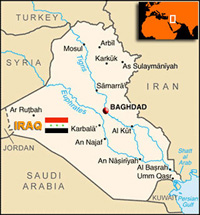BAGHDAD
Deposed president Saddam Hussein went on trial on Wednesday for causing the death of hundreds of thousands of his fellow Iraqis during 24 years of brutal rule.
But some of Saddam’s supporters in Iraq’s Sunni Arab community demonstrated in the streets to demand that the US-led forces which invaded the country two years ago be put in the dock instead.
Saddam appeared before a specially constituted court of five judges to answer a first charge that he had ordered the killing of more than 140 men in the small town of Dujail, 60 km north of Baghdad in 1982.
They were rounded up and executed shortly after armed men fired on Saddam’s motorcade as he passed through Dujail.
Just the first of many charges
However, prosecutors said this was just a first sample charge against Saddam and seven of his top henchmen who appeared in court alongside him.
They said Saddam would subsequently face additional charges. These included ordering the use of poison gas against villages suspected of supporting Kurdish separatist guerillas in northern Iraq in 1988 and brutally suppressing a Shi'ite Muslim uprising against his rule in southern Iraq in 1991.
New York-based Human Rights Watch said Saddam, who ruled Iraq with an iron fist, had been responsible for the deaths of “several hundred thousand people” during his time in power.
The bodies of many of them were found in mass graves shortly after his overthrow in April 2003.
Legal experts said Iraqi state prosecutors chose to begin with Dujail case because it was easy to compile in terms of evidence.
If found guilty as charged, Saddam and his co-defendants will face a mandatory death penalty.
Throughout the day, Saddam, dressed in a dark suit and carrying a copy of the Quran, remained defiant.
He rejected the court’s authority to try him and refused to even confirm his name, proclaiming that he was still President of Iraq.
"I preserve my constitutional rights as the President of Iraq. I do not recognise the body that has authorised you and I don't recognise this aggression," he said.
“Who are you? What does this court want?” the 68-year-old former president demanded of chief judge Rizgar Mohammed Amin.
Milions of people all over Iraq were glued to TV sets watching live the start of a trial that many of them had longed for.
Mixed emotions
“I hope he faces the worst penalty for what he did to the Iraqis. The death penalty is not enough. He needs to feel the same pain as thousands of others felt in this country. It is a happy and glorious day,” said Shams Ali, who lost two sons in the killings at Dujail.
International human rights organisations such as Human Rights Watch (HRW) and Amnesty International expressed satisfaction that Saddam was finally being called to account for the rivers of blood that flowed under his regime, but voiced concerns over the fairness of his trail and the political neutrality of the court.
In particular, they are worried about the degree of proof necessary to secure a conviction and are concerned that there is no legal mechanism for commuting the sentences of any defendant convicted on charges which carry the death penalty.
“Amnesty International considers the trial as an important first step towards bringing justice and reparation for victims of abuses committed during Saddam Hussein regime, but we insist that the death penalty is not the solution for the problem,” Nicole Choueiry, a spokeswoman for Amnesty International said in London.
HRW has also voiced concern that Saddam’s international team of lawyers will be unable to mount its defence case “in conditions equal to those enjoyed by the prosecution’ and that the judges may show political bias.
“We have grave concerns that the court will not ensure fair trials,” said Richard Dicker, director of the HRW International Justice Programme, who is leading a team of HRW observers at the trial.
“To ensure justice and its own legitimacy, the court must fix these deficiencies,” he said.
Saddam and the seven other former senior officials of his regime are being tried by a specially established Supreme Iraqi Criminal Tribunal, under a mixture of Iraqi and international law.
The trial is taking place in a marble palace in Baghdad’s top security Green Zone, which once served as Saddam’s military command centre.
As it started, several demonstrations in support of Saddam took place on the streets of the capital and in the former president’s home town of Tikrit, 175 km north of Baghdad.
Dozens of residents took to the streets in Tikrit, shouting “Saddam is innocent and the trial is unfair.”
“I cannot believe that I Saddam is on a trial,” said 62-year-old Mariam Kubeissy, 62, one of his supporters in Baghdad.
“He is strong enough to overcome this and the Americans. God bless him protect him from the death penalty,” she said with tears in her eyes.
However, leaders of the US-backed government in Iraq said the trial marked a key step in the country’s transition from dictatorship to democracy.
“This marks the end of the days of terror in Iraq and we waited years for this day which should be well remembered by all Iraqis due to the suffering we passed through all these years,” said Deputy Prime Minister Ahmad Chalabi.
Prosecution officials said at the end of the opening session that the trial had been adjourned until 28 November.
This article was produced by IRIN News while it was part of the United Nations Office for the Coordination of Humanitarian Affairs. Please send queries on copyright or liability to the UN. For more information: https://shop.un.org/rights-permissions





